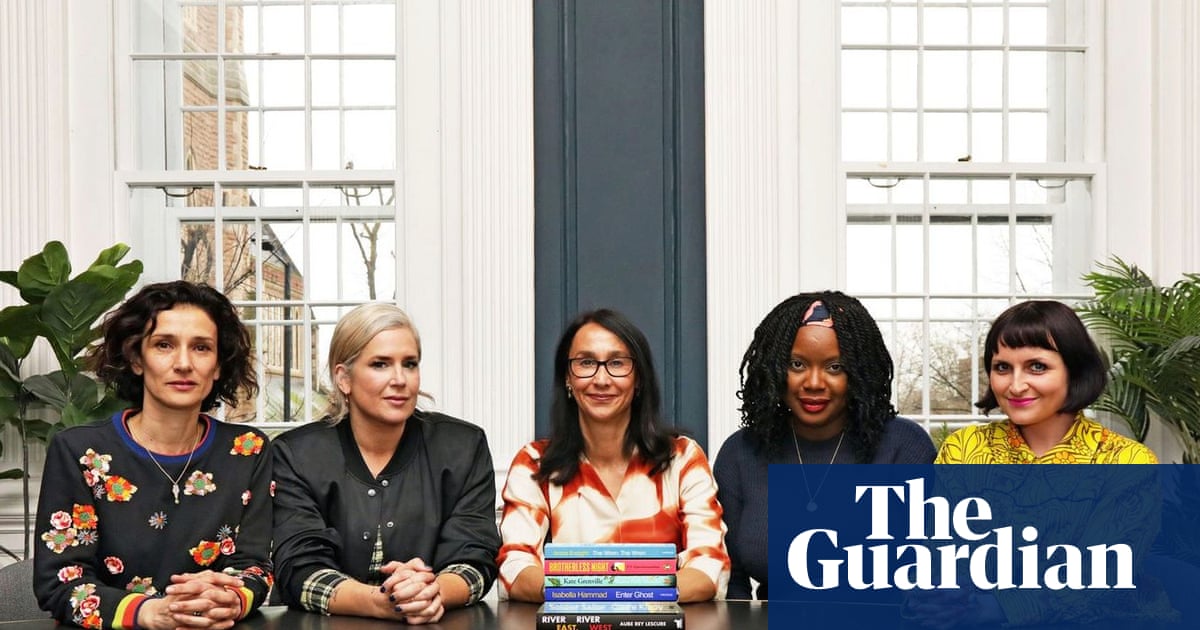
Very few literary prizes have the power to significantly move the needle in terms of securing a larger readership for the books they champion. One of those is the Women’s prize for fiction, and therefore it has been a great responsibility and honour for me and my fellow judges – Ayọ̀bámi Adébáyọ̀, Laura Dockrill, Indira Varma and Anna Whitehouse – to select this year’s shortlist. It features six spellbinding and thought-provoking novels.
Isabella Hammad’s Enter Ghost tells the story of Sonia, a British-Palestinian actor, who goes to visit her sister in Israel. She is persuaded to join a local theatre troupe that is attempting, against the odds, to stage a production of Hamlet in the West Bank. It’s an exquisite piece of storytelling that weaves history and politics and family with a profound meditation on the purpose of art. It’s nuanced, multilayered and gorgeously written and, as with all great novels, rewards multiple readings.
River East, River West by Aube Rey Lescure is set in Shanghai in the mid 2000s and opens with a wedding. Fourteen-year-old Alva is dismayed that her American mother, Sloan, is marrying Lu Fang, a local businessman. The narrative flips between Alva and Lu Fang, bringing to life Chinese history and society from the Cultural Revolution onwards. It’s an inversion of the cross-cultural or immigrant story, that examines identity and what it means to belong or be an outsider. It’s original, it’s often funny and it’s sometimes heartbreaking too.
Restless Dolly Maunder by Kate Grenville is based on the life of the author’s grandmother, beginning on a sheep farm in New South Wales in 1881. Dolly fights constantly against the constraints placed on her as a woman in a man’s world, and pays a high price for her nonconformity. She builds a business, then loses everything and is forced to start over – but she never loses her fighting spirit. Grenville writes prose that is simultaneously plain and poetic, and we are transported to those harsh and beautiful landscapes that mirror the pain and beauty of Dolly’s struggles.
Sashi, the protagonist of Brotherless Night by VV Ganeshananthan, begins her account of the Sri Lankan civil war with a prologue set in New York in 2009, before circling back to her childhood in Jaffna. She and her four brothers have bright futures ahead of them. Sashi is determined to become a doctor, an ambition she fulfils despite the war. But all of her brothers become, in very different ways, lost to her because of the conflict. This is a searing, deeply moving novel that centres on women’s experience of war, that bears witness to the suffering and brutality of all sides, and is unflinching in its commitment to complexity and clear-eyed moral scrutiny.
The Wren, The Wren by Anne Enright explores the messy, often fraught relationship between Carmel and her daughter, Nell, and the long shadow thrown over the family by Carmel’s famous poet father, Phil. In scalpel-sharp prose, Enright evokes trauma, anger, resentments and even violence, and also the river of love that flows beneath it all. There are wider themes here too, such as if and how art can be viewed separately from the artist, and the nature of memory. It is a dazzling achievement.
Another book that examines motherhood with searing honesty and originality is Soldier Sailor by Claire Kilroy. Addressed by a new mother to her infant son, it examines the unexpected grief about the life she’s lost, the brutal banalities of childcare and the overwhelming love she experiences. Raw, funny and angry, it is a novel that provokes a huge range of emotions in the reader: sorrow for the agony that the new mum endures, laughter and tenderness, and awe at the elemental and universal aspects of parenthood.
While some of the titles we have chosen focus on intimate family relationships, others encompass a sweep of history. Yet in all six novels on the shortlist, whether in the home or in the context of war and political upheaval, there is an eye on the particularity of women’s experience.
after newsletter promotion
